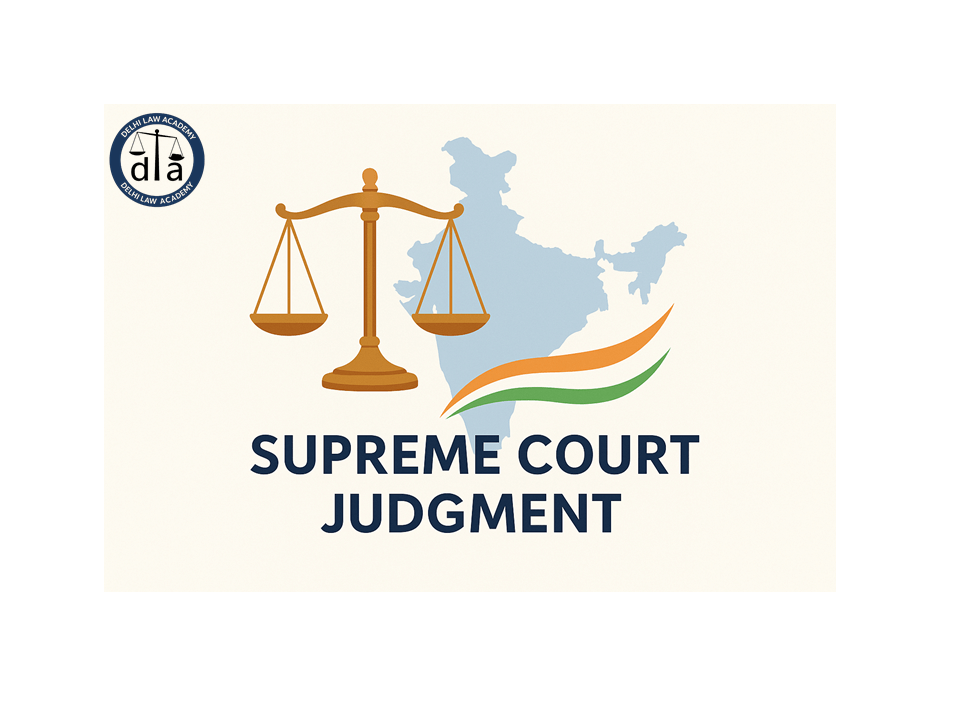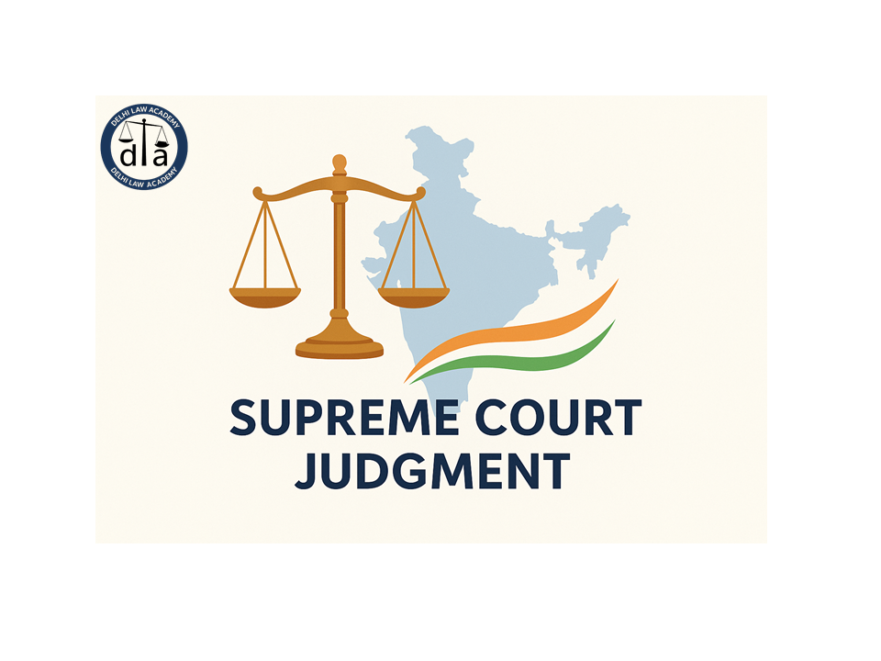
⚖️ Two Supreme Court judgments on a void sale deed
“A sale deed executed without payment of price is void”.
🏛️ Delhi Law Academy Jaipur presents below for aspirants of Rajasthan Judicial Service (RJS), DJS, PCS(J) and other Judicial Services throughout India the most recent judgment of the Supreme Court of India, delivered just yesterday on 12th September 2025, declaring a sale deed void on the ground that the buyer could not prove payment of price.
📑 Presented below: Summarized version [by Delhi Law Academy Jaipur] of the Supreme Court Judgments in two cases declaring the sale deeds void on the ground that the buyers could not prove payment of price:
📌 Case 1: Shanti Devi v. Jagan Devi [2025 INSC 1105]
12 September 2025 — Supreme Court of India
Judgment
5. The plaintiffs instituted Civil Suit No. 782 of 1984 in the court of Senior Sub Judge, Gurgaon for permanent injunction restraining the defendant from interfering with their peaceful possession to the extent of one-third share in the agricultural land admeasuring 31 kanals 4 marlas…. In the alternative, the plaintiffs prayed that they be put in joint possession along with the defendant and the sale deed dated 14.06.1973 purported to have been executed by Ram Saran s/o Bhambar and the plaintiff in favor of the defendant be declared as fraudulent, concocted and thereby, void insofar as the share of the plaintiff is concerned.
34. We may look at the matter from one another angle. Apart from the aspect of fraud, the decision of this Court in Kewal Krishnan v. Rajesh Kumar and Others reported in (2022) 18 SCC 489, while looking into whether the defendants had paid any sale consideration to the plaintiff while purchasing the plaintiff’s share in the property, held as follows:
- First, that the sale of an immovable property would have to be for a price and such a payment of price is essential, even if it is payable in the future. If a sale deed is executed without the payment of price, it is not a sale at all in the eyes of law, specifically under Section 54 of the Transfer of Property Act, 1882. Such a sale without consideration would be void and would not affect the transfer of the immovable property.
- Secondly, that, in the said case, the defendants could not rebut the allegation of the plaintiff that no sale consideration was paid as no evidence was adduced to indicate – (a) the actual payment of the price mentioned in the sale deeds and, (b) that the defendants had any earning capacity at the time of the transaction such that the sale consideration could have been paid. As such the sale deed being void for want of valid consideration, could not be said to have affected the one-half share of the plaintiff in the suit properties nor have conferred any right of title on the defendants. In fact, it was held that the sale deeds were a sham and must be ignored.
- Lastly, it was reiterated that a document that is void need not be challenged by seeking a declaration as the said pleas can be set up and proved even in collateral proceedings.
35. As far as the facts of the present matter are concerned, the plaintiff specifically averred that she never obtained any sale consideration from the defendant. On this aspect, the plaint reads as follows:
“(c) That the plaintiff never got any sale consideration of the alleged sale deed and she came to know about this fraudulent transaction only when she came to the village mourn the death of Ram Saran and heard that her land is going to be sold by the defendant without any right in it”
36. Admittedly, the sale consideration is Rs. 15,000/- as per the sale deed. The sale deed indicated that, out of the total sale consideration, the plaintiff and the other vendor i.e., Ram Saran, had already allegedly received Rs. 9000/- from the defendant and that the remaining amount of Rs. 6000/- would be received at the time of the execution of the sale deed, in front of the Registrar. The relevant portion of the sale deed reads thus:
“[…] now we with our own sweet will have sold the above land measuring 31 kanal 4 marla, along with all the rights to Smt. Shanti wife of Bagdawat son of Harnath, resident of Akbarpur, for Rs. 15000/. Possession has been delivered to the vendee. Out of the total sale consideration, we have already received Rs. 9000/- from the vendee and remaining amount of Rs. 6000/- will be received in front of the Sub Registrar. Expenses of the stamp papers have been borne by the vendee itself […]”
37. The endorsement made by the Sub Registrar at the time of the execution of the sale deed, reads thus:
“That the contents of the sale deed have been read over and understood to Ram Saran 2/3rd share, Risali 1/3rd share, and Bhadgawat husband of vendee. They have verified the same and the vendors have received Rs. 6000/- from the husband of the vendee in the presence of the Sub Registrar. Both the parties have been identified by Mahadev Singh Sarpanch, and witness no. 2 Budhu.[…]”
38. Concurrent findings of both the First Appellate Court and the High Court indicated that the husband of the defendant i.e., one Bagdawat, who had allegedly given the remaining sale consideration of Rs. 6,000/- during the time of execution of the sale deed, had not stepped into the witness box. Furthermore, one of the attesting witnesses to the execution of the sale deed i.e., the Sarpanch had also died before his deposition could be recorded. One Budhu, who was the second attesting witness, was the brother of the defendant and both the Courts had doubted his testimony as being partial to the defendant. All in all, there was no witness who could substantiate the case of the defendant that there was part-payment of the sale consideration, i.e., Rs. 6,000/- during the time of execution of the sale deed.
Furthermore, no evidence was adduced by the defendant to prove that even the initial amount of Rs. 9,000/- which was purportedly paid before the execution of the sale deed was actually received by the plaintiff. Therefore, the averment of the plaintiff in the plaint, that she had not received the sale consideration, had not been otherwise proven as false. In such circumstances as well, i.e., in the absence of the sale consideration being tendered, the sale deed would be void and the plaintiff would not be required to seek its cancellation. Therefore, Article 59 of the Limitation Act, 1963 could not be said to be applicable to the present facts.
39. The First Appellate Court had rightly observed that the plaintiff had claimed the relief of joint possession. It had also arrived at the finding that the transaction in question was void. To put it simply, in the eyes of the law, the plaintiff could not be said to have executed the sale deed. Therefore, the plaintiff could indeed have maintained an action to obtain possession of the property on the basis of her title and filed the same within the period of 12 years from the date of knowledge that the possession of the defendant was adverse to that of the plaintiff. Even if the date of execution of the sale deed, i.e., 14.06.1973 is considered, the suit having been filed on 28.02.1984, i.e., almost 11 years later, could be said to be well within limitation as stipulated under Article 65.
📌 Case 2: Kewal Krishnan v. Rajesh Kumar (2022) 18 SCC 489
18. Section 54 of the Transfer of Property Act, 1882 reads thus:
“54. “Sale” defined.—“Sale” is a transfer of ownership in exchange for a price paid or promised or part-paid and part-promised.
Sale how made.—Such transfer, in the case of tangible immovable property of the value of one hundred rupees and upwards, or in the case of a reversion or other intangible thing, can be made only by a registered instrument.
In the case of tangible immovable property of a value less than one hundred rupees, such transfer may be made either by a registered instrument or by delivery of the property.
Delivery of tangible immovable property takes place when the seller places the uyer, or such person as he directs, in possession of the property.
Contract for sale.—A contract for the sale of immovable property is a contract that a sale of such property shall take place on terms settled between the parties. It does not, of itself, create any interest in or charge on such property.”
Hence, a sale of an immovable property has to be for a price. 💰 The price may be payable in future. It may be partly paid and the remaining part can be made payable in future. The payment of price is an essential part of a sale covered by Section 54 of the TP Act. If a sale deed in respect of an immovable property is executed without payment of price and if it does not provide for the payment of price at a future date, it is not a sale at all in the eye of the law. It is of no legal effect. Therefore, such a sale will be void. ❌ It will not effect the transfer of the immovable property.
19. Now, coming back to the case in hand, both the sale deeds record that the consideration has been paid. That is the specific case of the respondents. It is the specific case made out in the plaints as originally filed that the sale deeds are void as the same are without consideration. It is pleaded that the same are sham as the purchasers who were minor sons and wife of Sudarshan Kumar had no earning capacity. No evidence was adduced by Sudarshan Kumar about the payment of the price mentioned in the sale deeds as well as the earning capacity at the relevant time, of his wife and minor sons. Hence, the sale deeds will have to be held as void being executed without consideration. Hence, the sale deeds did not affect in any manner one half-share of the appellant in the suit properties. In fact, such a transaction made by Sudarshan Kumar of selling the suit properties on the basis of the power of attorney of the appellant to his own wife and minor sons is a sham transaction.
Thus, the sale deeds of 10-4-1981 will not confer any right, title and interest on Sudarshan Kumar’s wife and children as the sale deeds will have to be ignored being void. It was not necessary for the appellant to specifically claim a declaration as regards the sale deeds by way of amendment to the plaint. The reason being that there were specific pleadings in the plaints as originally filed that the sale deeds were void. A document which is void need not be challenged by claiming a declaration as the said plea can be set up and proved even in collateral proceedings.
21. As no title was transferred under the said sale deeds, the appellant continues to have undivided half-share in the suit properties. That is how the District Court passed the decree holding that the appellant is entitled to joint possession of the suit properties along with Sudarshan Kumar. 🏠
❓ Frequently Asked Questions on Void Sale Deeds
📚 Further Reading for Law Aspirants
Explore more useful resources from Delhi Law Academy to strengthen your preparation:
Contact us
📍 Delhi Law Academy – Jaipur Branch
6C, Tower 2, Coaching Hub, Pratap Nagar, Jaipur – 302033
📞 Phone:
+91 9911916552
+91 8447285606
✉️ Email:
contactus@delhilawacademy.com

